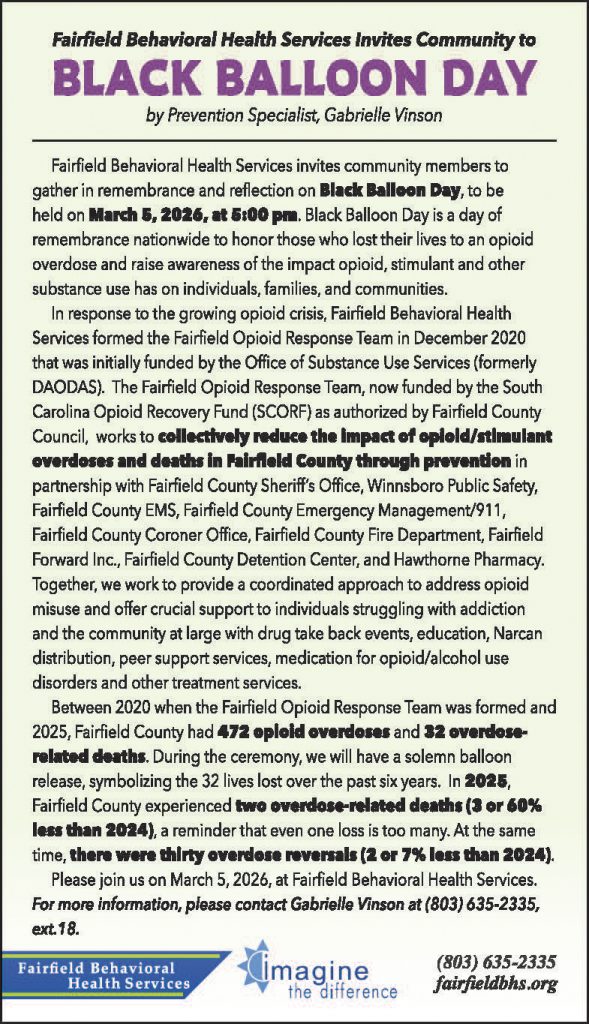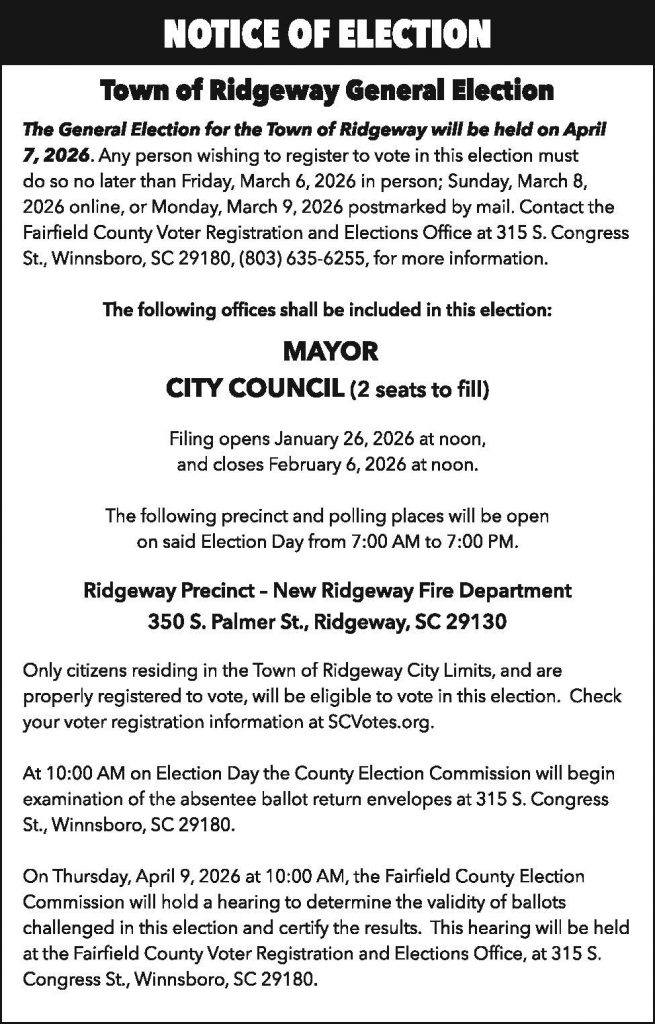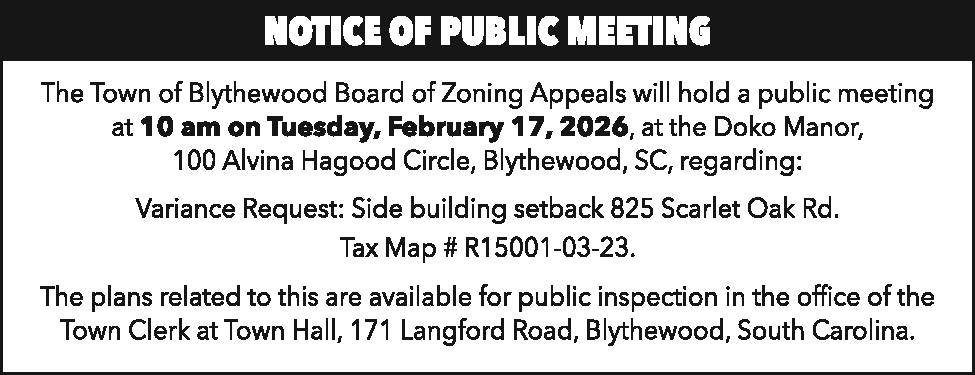AIRFIELD COUNTY – After more than three months of deliberation, the Fairfield County Animal Control Ordinance Ad Hoc Committee voted unanimously on July 15 to approve its draft of recommended changes to the existing animal ordinance. The 7–0 vote marks the conclusion of an 18-hour public meeting series that began on April 9 and resulted in a comprehensive revision of the county’s animal laws.
“This is not a perfect ordinance, said Committee Chair Katie Titus, “but it reflects what’s possible through compromise and community focus.”
Key Provisions
The final draft contains 25 sections—up from the original 22—reflecting structural updates, new definitions, and added enforcement tools. The following were added to the ordinance:
Mandatory Microchipping: All dogs in the county must be microchipped and wear a collar bearing the owner’s name and phone number. The county council and administrator will determine the process and who will have oversight.
One-Time Pet Registration: Dogs and cats must be registered by six months of age, with proof of rabies vaccination and a registered microchip. While the ordinance does not set a fee, committee members suggested keeping it low to encourage compliance
Commercial Breeder Permits: Individuals with three or more intact animals used for breeding must obtain a permit and provide health records. While both the AKC (American Kennel Club and the UKC (United Kennel Club) recognize a person who breeds one animal as a breeder, the majority committee’s proposal was much more lenient.
Under the proposed draft, only those owning three or more unsterilized dogs or cats used for breeding and selling offspring would be classified as breeders and be required to obtain a permit. However, not all committee members supported these regulatory expansions during earlier discussions.
“We’re trying to get at the backyard breeders too, not just those calling themselves commercial,” noted committee member Griffith who opposed the more lenient regulations
Restrictions on Sales: The ordinance bans the sale or giveaway of pets under eight weeks of age and prohibits sales in the county’s parking lots, flea markets, or as purchase incentives.
Animal Transport Requirements: A last-minute amendment added hydration to existing transport requirements, which already included adequate space and ventilation.
Redemption Tiers and Sterilization: The controversial Section 4-16 will allow, if passed by County Council, at-large animals to be reclaimed by their owners unaltered under certain conditions, but adds increasing fees and mandates sterilization after multiple impoundments.
While 22 sections passed unanimously, three saw dissenting votes—each tied to sterilization policies or the registration requirement.
The committee opted to keep detailed tethering regulations, including specific trolley system requirements, and added a provision mandating spay or neuter for dogs continuously housed on trolley systems, unless medically exempt.
The committee also approved updates clarifying Animal Control’s authority to enter premises where a violation exists, expanded euthanasia discretion for veterinarians in cases of severe injury or illness, and confirmed penalties for violations. Those fees would be set by county council and administration if council votes to accept this proposal to the ordinance.
Final Reflections
Each committee member was given the opportunity to reflect on the process and outcome. All who spoke emphasized the urgent need for enforcement funding and clearly defined penalties.
Committee member Dr. Roger Gaddy urged the County Council to ensure the attorney’s review does not override the committee’s intent.
“Don’t go rewriting all this work. We put in 18 hours, and it’s a good compromise,” he said.
Others stressed the importance of real-world enforcement.
“This ordinance is worthless if it’s not enforced,” said member Laura Thomas, calling on Council to fund additional personnel and assign specific citation penalties.
Committee member Aimee Griffith gave an emotional appeal.
“I have found myself sitting up here and feeling more alone than I thought I would have ever felt,” she said. “We are fighting for the animals who have no advocate… There will be thousands affected by the words we’ve written.”
Ann Corrao voiced concern over Section 4-16, calling it a step backward.
“The tiered system takes us backward by releasing fertile animals to be active in the community for longer periods of time—animals that have proven to be at large. Thus, increasing, not decreasing, the unwanted and feral populations,” she warned, while still supporting the committee’s broader work.
“We need changes,” said Jerome Armstrong, who had opposed registration in earlier discussions. “I think it is critical that we keep on pushing whatever adjustments they [Council] make.”
Committee Chair Katie Odum Titus closed out the meeting saying she appreciated the dedication shown by the committee and supporting county staff, including Animal Shelter Director Joann Shaw and County Administrator Vic Carpenter.
“I think legislating and governing is a balance of regulating bad actors while allowing a certain amount of autonomy and freedom to those individuals who are doing the right thing, seek to follow the law,” said Titus who had fought for the more lenient breeder classification.
Next Steps
County Administrator Vic Carpenter confirmed the draft ordinance recommendations will be presented at the Aug. 11 Council meeting. He said Council will not vote immediately but will receive the committee’s proposal and begin a period of review.
Titus will present the draft to Council along with a section-by-section summary and a record of committee votes. The official summary and draft will be submitted by July 19 for County Attorney Tommy Morgan to review before public release.
“It’s now up to Council to move this work forward,” Carpenter concluded.
















